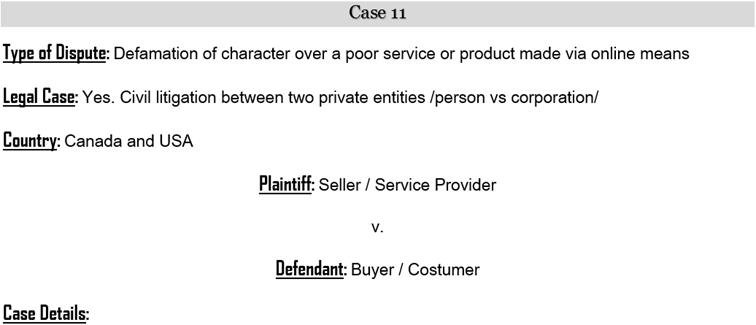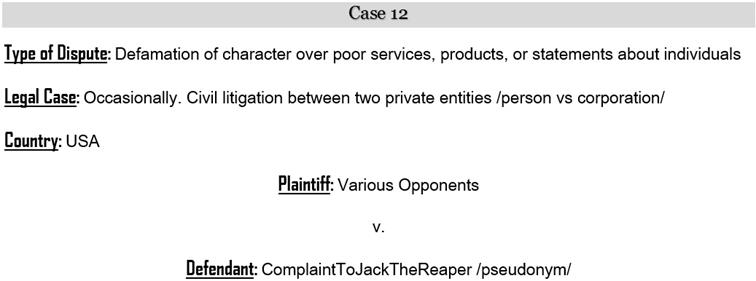Online Defamation Cases - Part II
Introduction
We all know how important it is nowadays to have a clean online record, almost as important as having no previous criminal offences. That is why often page 1 of well-used, popular search engines like Google, Bing and Yahoo is considered sometimes your digital business card or personal record; people can search you anytime and make certain conclusions based on the information they find there.

FREE role-guided training plans
So imagine that you are an owner of respectful business and one morning, out of nowhere, a very critical post appears about you on the top of page 1. Then any potential customer merely by seeing this top post may say "Ok, that's a nasty review for these guys. Maybe it's nothing, but let's not take chances," and skip to your competitor. On that point, world leading companies like Google have the great responsibility to uphold everyone's reputation with the utmost care. And it is not about the interaction between clients and sellers only. As you will see, defamation of character can occur for a variety of reasons.

For the purposes of this article, the reference to real names of individuals, firms or websites is reduced to a minimum. Instead, initials are used for people and pseudonyms or paronyms for websites. This is made out of respect to the reputation of the person/firm/website and also to allow the reader to focus on the details surrounding each case, not the names involved. Also, the idea of this article is not dissuade you from using certain services or websites. On the contrary, use them but use them in good faith.
Defamatory Statements made on Consume Review Websites

When a service does not measure up, clients should have an opportunity to make a complaint somehow. Nevertheless, they need to be careful with what they post, because a bad review may lead to retaliation. Such a review gave a start of ruthless online skirmishes between a Toronto couple and a contractor.
"We paid what we thought was a fair price and we got very poor service," was stated in the 2,000-word review posted by the Canadian man and woman on several websites, giving the company a rating of half a star out of five stars. The owner of firm responded vehemently, saying that the whole review is nothing more than a toxic rant, aiming to destroy his business. He threatened to sue if the negative reviews were not deleted. And the threat actually worked because the couple shortened the review to 30 words, explaining that they had had a bad experience, felt intimidated at some moments, and not planning to use the services of the firm again. Maybe you would suggest that this new version could be more easily accepted by the contractor? You would be wrong. He posted a comment next to the revised review, in which he said that "the clients had mental health issues and wanted to get the job for free. Then the online war turned into a phone war."
While the outcome in this case is unclear to me, the moral that can be extracted is that you need to be careful when you post a bad review on someone, even if it is true, because it may create an avalanche of negative occurrences undesired and deleterious to all parties involved.
In a very similar case to the previous one, with the difference that it ended up in court, a homeowner from Virginia vented his anger about what he considered a poor workmanship by writing a critical review of the contractor hired to do the project on the website Kelp /pseudonym/. The customer even implied that he stole her jewellery. The contractor sued the homeowner for $750,000, a sum that is meant to cover the loss of business caused by the defamation. A series of lawsuits followed, which the contractor ending up winning. But there were no actual winners here, since the Virginia court refused to award him any damages due to the fact that both parties had exchanged defamatory comments to the detriment of one another. Another great Pyrrhic victory is won.

1. Defendant's Business Practices
Unlike other similar websites that lump together good and bad reviews, ComplaintToJackTheReaper is focused on the negative experiences. This website has a policy to never remove a post under any circumstances. This is bad news for someone that thoughtlessly decides to "expose" another person or firm. It is getting even worse – the posts 'come into force' immediately. Once published, the offending content cannot be removed even when both parties request that. The argument of ComplaintToJackTheReaper is not leaving a 'might is right' leverage that will favour big companies and threaten consumers to submit themselves to the will of the more powerful.
With more than a million visits a week, the company's popularity is undisputed. Google's secret algorithm always rank their links high on the first page. So being popular among the search engines is one thing, but is this kind of business profitable?
ComplaintToJackTheReaper has a variety of ways to generate profit. Companies against which a complaint was filed can pay between $5,000 and $100,000, depending on the volume of complaints. This sum buys you the service for inspection of whether the complaints have been settled. After a positive check-up, the website will replace the headline and insert a lengthy explanation above the original complaint. On the reappearance of the same complaint, the website will strip off the positive headline and text. The scheme must be working well, at least for the owner, because he reported that they have nearly 500 new customers every year. Entities accused of a wrongdoing may also choose to pay about $2,000 to an independent arbitrator to examine whether the facts in the postings are truthful. They may redact wrong facts or update outdated info, but do not remove complaints – everything else stays the same and the post remains anchored here in perpetuity, or at least until the digital equivalent of the Judgement day.
Many criticize the morality of such websites, among other things. For these opponents, such websites' existence is only submitted to the idea of making money on the expense of everything and everybody else. B.T., a golf club manager who had spent almost $5,000 in legal fees in a desperate attempt to remove a 2006 complaint said: "The company has no interest in finding the truth unless they personally profit." By way of illustration, unless paid for arbitration services, ComplaintToJackTheReaper will not fix any false info whatsoever.
All of this is perfectly legal. In 2011, a Florida court ruled that irrespective of the 'appalling' business practices conducted by the ComplaintToJackTheReaper, the current law is on their side. As we remember from the article about the cyber libel and legislation, websites are not liable for any content placed on their websites by third parties – for instance, Skype is not to be blamed if one person defames another on their chat. While in the example above the law make sense, protection is also given to other more shady activities.
Among many other variables contributing to the flourishing of Internet defamation is online anonymity offered by such websites to users. In reality, anonymous users can write anything with little forethought of whether what he says is right, provable, and not unwarrantable or insulting to others. Another site that offer similar functions, like one called BBB, requires complainants to provide valid identity information, which will diminish, for example, the duplicitous intentions of industry rivals.
2: Your Options After a Complaint is Made for You:
Posting a rebuttal will not change much, because it goes beneath the original report, and the negative lines stick out "head foremost." Believe it or not, disproving can make things worse by giving more material for search engines to index. If the stubbornness is taking the best of you and you have firmly decided to post a rebuttal, do not use names or other keywords that will direct search engines back to you.
Payment for an advocacy program offered by the website might help to a point. After an investigation, a positive statement can be placed on top of the original complaint.
Suing the original author of the report will by no means remove his offending statement, nor is he likely to reimburse you for the financial loss resulted from the fact that others 'think less' of you as a person, or your product or firm, based on the libel.
You can hire a reputation management agency to push back the negative statement for you to the tail-end of Google's page 1, and even to next pages. Money-wise, that is an expensive option.
Suing ComplaintToJackTheReaper is even more expensive — almost the same as throwing money down the drain. The current legislation clearly indicates that online service providers are protected from illegal content posted on their domain by third parties.
Cases Details:
A woman from California was defamed on ComplaintToJackTheReaper in a post saying that she infected at least 4 males with AIDS. The post comes with a photo of her. She tried everything to restore her reputation, even took an HIV/AIDS test as proof. Yet this was of little effect because the post is still there, on top of all info about her on Google, and many would shun her just because of the rumour itself.
The next case is particularly interesting. It involves T.R., a woman serving a life sentence for first-degree murder in 2001, and her mother A.R. On the report of Sac County Attorney Ben Smith, the two of them "have been engaged in a systematic and ongoing campaign of cyber/Internet harassment and defamation aimed directly at the state's witnesses, in relation for their cooperation with law enforcement." A.R. allegedly paid and provided information to a man who posted calumnious commentaries on the ComplaintToJackTheReaper, accusing "the state's witnesses of theft, perjury, fraud, computer hacking, child molestation, murder, and terrorism." Designed to come up first on a web search of the witnesses' names, these posts may have a devastating effect on their reputation. One of the witnesses told Smith that his business had "suffered greatly" in consequence. The person who made these posts is reported to be a ComplaintToJackTheReaper employee D.M. He is now arraigned in a US court on a multiple charges, including witness tampering, extortion, and other felonies and misdemeanour. D.M. said that owner of the website directed him to make these posts.
Conclusion
Defamation on the Internet is a problem that will undoubtedly grow in size as the technological means of communication improve. Self-evidently, there can be many scenarios that would eventually lead to the same result – defamation followed by a due response.
In principle, there is nothing wrong a person to voice his opinion if he thinks he was wronged somehow or just wants to express his point of view. And in principle, there is nothing wrong with websites providing people with the opportunity to voice their opinion. Just remember not to go beyond that point where common decency usually is. Otherwise, you risk overstepping the mark and getting yourself into real troubles.

Reference List

Get your guide to the top-paying certifications
With more than 448,000 U.S. cybersecurity job openings annually, get answers to all your cybersecurity salary questions with our free ebook!
All URLs available on 04/11/2014:
- http://www.thestar.com/business/personal_finance/2013/11/12/how_to_write_bad_review_without_getting_sued_roseman.html
- http://www.bbb.org/detroit/news-events/bbb-in-the-news/2014/09/did-ripoff-report-steal-the-consumer-voice/
- http://searchengineland.com/how-to-remove-ripoff-reports-from-google-not-just-bury-them-65173
- http://www.washingtonpost.com/local/in-closely-watched-yelp-case-jury-finds-dual-victory/2014/01/31/2d174580-8ae5-11e3-a5bd-844629433ba3_story.html
- http://tcattorney.typepad.com/digital_millennium_copyri/2014/09/ripoffreport-and-owner-ed-magedson-targeted-as-part-of-criminal-investigation.html
- http://www.desmoinesregister.com/story/news/crime-and-courts/2014/07/10/tracey-richter-mother-linked-witness-harassment-search-warrant-computer-flash-drives-seized/12444821/
- http://www.forbes.com/sites/adamtanner/2013/05/09/love-it-or-hate-it-ripoffreport-is-in-expansion-mode/









